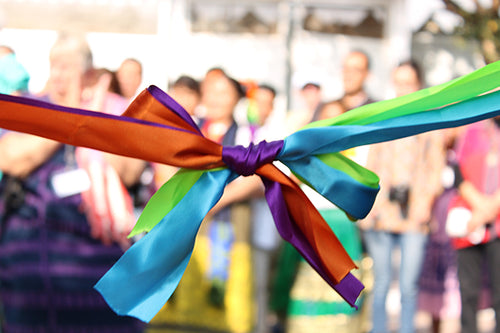
Marta Julia Méndez Hernández / Jalabil Antsetik, Aldama, Chiapas
Aldama is known for its beautiful ceremonial huipiles (indigenous dress), as well as for its rustic everyday huipiles. Ceremonial huipiles are recognized by the symbols on the last row of the huipil representing a saint. The symbols, typical of Aldama, act as a signature identifying his works. Some people may read Aldama's huipiles as a book. Each symbol has its own style and meaning. Today, two types of everyday huipiles are seen. The simple ones that are very thin vertical lines of two colors and few symbols, and the more ornate ones seen on local women, usually not for sale. Both are extremely durable and comfortable and are made of cotton on the back straps with acrylic thread brocade. The more expensive ones have cotton or wool brocade. Some women also wear huipiles embroidered with white blanket, but they are generally not made to sell.
The huipiles sold to outsiders have been modified to suit the fashion of the day and make them more wearable. They are narrower, have larger holes for the head and arms, and can be simple and less ornate. Colors also vary widely.
In a category of their own, ceremonial huipiles are made for special church events and for the offering of the saints on their day. These are treasures and are kept in special trunks by the mayordomos (people in charge), representing the textile history of the people. Many of the ceremonial huipiles are considered the personal property (almost the soul) of a woman, and women are usually buried in their best huipil. Ceremonial huipils can be seen at national and state competitions and in upscale stores and galleries. They are wearable works of art. The highest quality ones are made of hilera (fine cotton thread) and natural dyed wool brocades.
Jalabil Antsetik is a cooperative of 20 women that was established to facilitate the sale of their work. It is not uncommon for husbands not to allow their wives to travel and, therefore, the women form groups to sell their work in tourist stores and share the expenses of sales trips when they go out. The women who go out to sell or travel are those who have more or less indulgent husbands. Women alternate their travel, so they do not always leave home. The women receive a small percentage of the sales since she cannot weave while traveling. Their travel expenses are covered by the cooperative, but no one is paid a salary.
Martha Julia is the president of the cooperative and her husband and family have supported her in her work. She and her mother participate in competitions that are ways to earn additional income.
The huipiles made by the cooperative cover the full spectrum, everyday and ceremonial, and they also create modern designs to sell to the public, as well as a variety of pillow covers, towels, wallets, purses, etc. and natural dyes.
Martha and her mother have participated in contests and have won several awards. The latest ones are: second place for a Huipil in the XLII Editors' Concert for the National Popular League 2017 and first place for a ceremonial costume in the XXXIII Concert of the Fray Bartolomé de las Casas Crafts 2018.
Cooperativa Jalabil Antsetik (Mujeres Tejedoras)
Av. Juan Aldama SN
Aldama Magdalena, Chiapas
967 141 2455 celular Whatsapp

